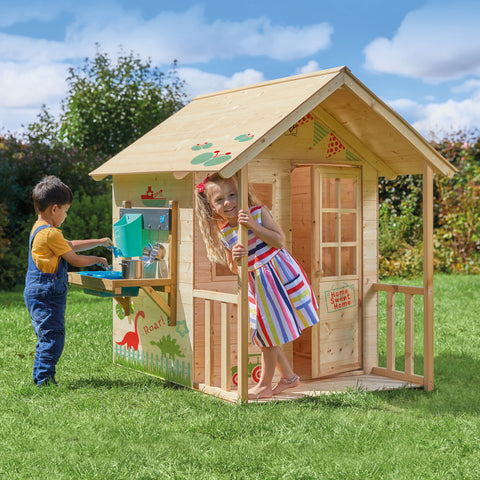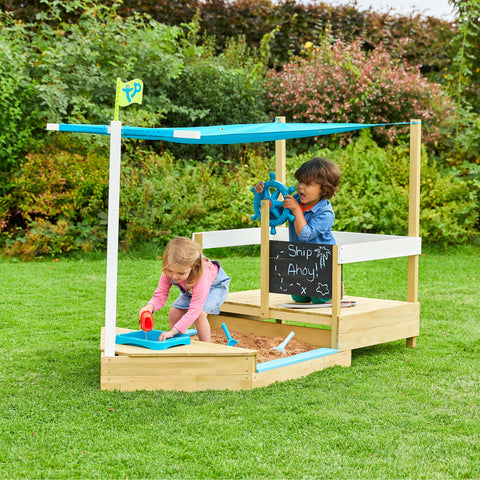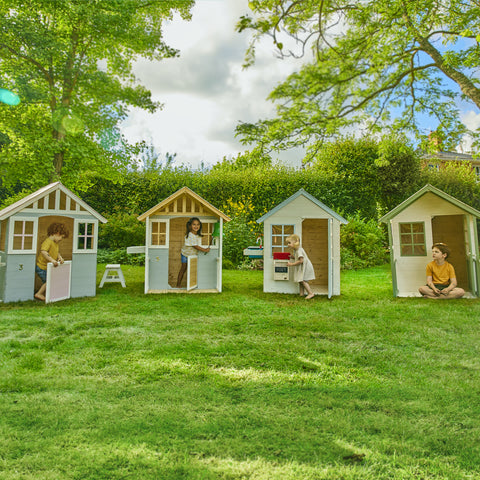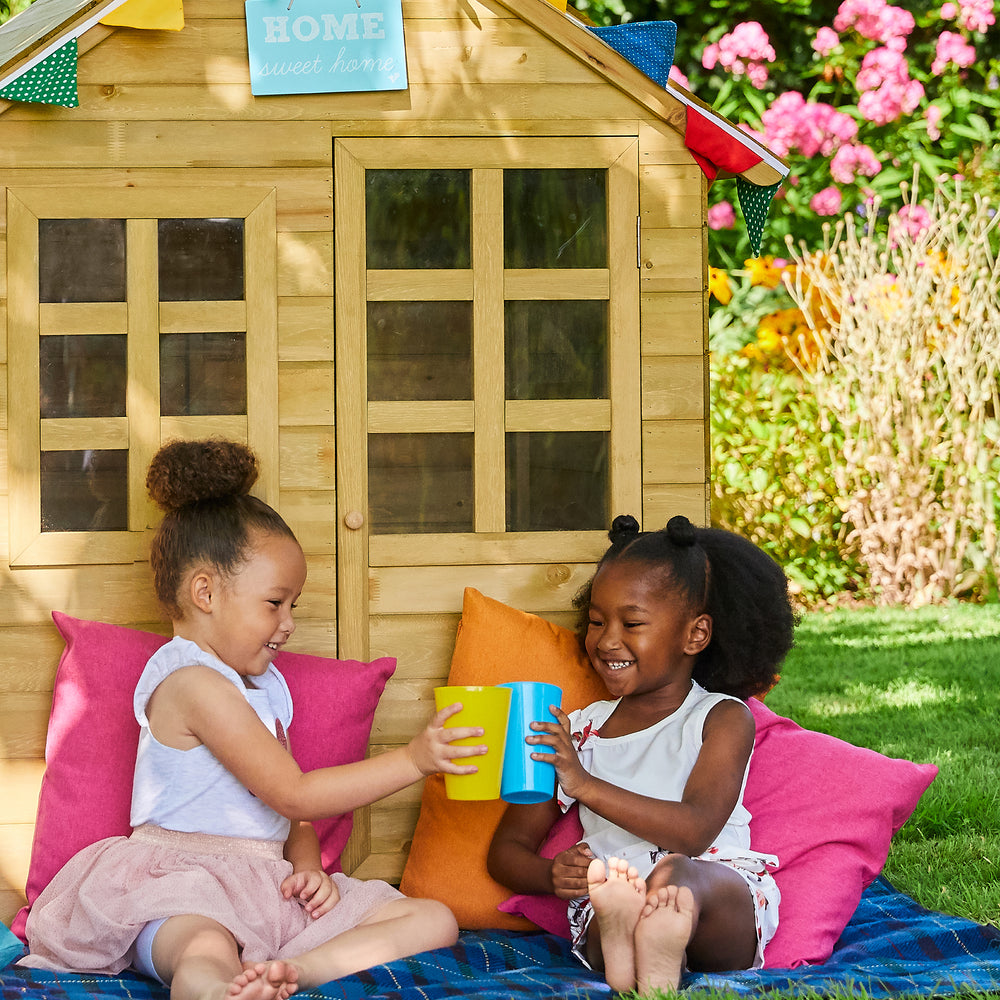Playhouses are not merely structures; they are portals to a world of boundless imagination and endless possibilities. These vibrant hubs of activity beckon children to step into realms of make-believe, where they can transform into pirates sailing the high seas, princesses reigning over enchanted kingdoms, or explorers venturing into uncharted territories. Within the confines of a playhouse, the boundaries of reality blur, and children are free to unleash their creativity, expand their motor skills, experiment with new roles, and embark on adventures limited only by their imagination.
Moreover, wendy houses serve as more than just platforms for solitary play; they are bustling epicentres of social interaction and collaboration. Here, children come together to share stories, collaborate on projects, and engage in cooperative games. Through these shared experiences, they learn invaluable social skills such as communication, empathy, and teamwork, laying the foundation for positive relationships and meaningful connections.
In this article, we delve deep into the multifaceted role of playhouses in shaping social development and fostering group play among children. From facilitating social interactions to promoting inclusivity and utilising playhouses as tools for skill development, we explore the transformative power of these structures in nurturing the social and emotional growth of young adventurers. So, join us as we embark on a journey into the captivating world of playhouses, where every moment is an opportunity for discovery, friendship, and endless fun.

Facilitating Social Interactions
One of the primary functions of playhouses is to provide a conducive environment to develop different types of communication and social interaction skills. Within the confines of a playhouse, children have the opportunity to move beyond working on their written communication and engage in face-to-face interactions. Verbal communication, and non-verbal cues such as eye contact, body language and facial expressions help children develop essential social skills, such as empathy, cooperation, and understanding of social norms.
Encouraging Cooperative Play
In addition to fostering imaginative play, playhouses provide an ideal setting for cooperative activities that promote teamwork and collaboration among children. Within the confines of a playhouse, young adventurers embark on collective adventures, pooling their creativity and resources to bring their shared fantasies to life.

Whether they're constructing elaborate structures with building blocks, hosting make-believe tea parties, or embarking on daring expeditions through imaginary jungles, playhouses encourage children playing together to work towards common goals.
These collaborative play experiences offer invaluable opportunities for children to develop essential social skills such as communication, problem-solving, and conflict resolution. As they negotiate roles, share resources, and navigate complex social dynamics, children learn to respect each other's ideas, compromise in the face of disagreements, and appreciate the value of teamwork.
Through cooperative play in playhouses, children not only forge lasting friendships but also lay the groundwork for positive social interactions and effective communication in their future endeavours.
Promoting Inclusivity
Promoting inclusivity within the playhouse environment goes beyond mere accessibility—it's about creating a culture of acceptance and celebration of diversity. These structures serve as microcosms of society, where children learn to embrace differences, appreciate individual strengths, and respect varying perspectives.

Playhouses are intentionally designed to cater to diverse play styles and interests, offering a range of activities and features that appeal to children with different abilities and preferences.
Whether it's a sensory garden for tactile exploration, a role-play kitchen for imaginative storytelling, or a quiet reading nook for introspective play, playhouses accommodate a spectrum of interests and needs.
By promoting inclusivity, playhouses foster a sense of belonging and acceptance among children, regardless of their background or abilities. In these inclusive play environments, children learn the value of empathy, cooperation, and understanding, laying the groundwork for a more inclusive and compassionate society.
Moreover, an inclusive playground provides valuable opportunities for children to learn from one another, exchange ideas, and collaborate on shared projects. Through collaborative play experiences, children develop essential social skills such as communication skills, problem-solving, and conflict resolution, enriching their overall development and enhancing their ability to navigate diverse social contexts.
Utilising Wendy Houses for Skill Development
Utilising playhouses for skill development offers a dynamic approach to learning that is both effective and enjoyable for children. Parents and caregivers can integrate various educational activities into playhouse play sessions to target specific skills and objectives. For instance, setting up a role-playing scenario in the playhouse can encourage children to practise their skills of communication including negotiation skills, conflict resolution and team leadership. Organising group games or challenges within the playhouse environment fosters teamwork and collaboration as children work together to achieve shared goals.
Furthermore, playhouses provide a safe and supportive setting for children to explore social dynamics and practice conflict resolution skills. Adults can guide children through scenarios where they encounter disagreements or misunderstandings, helping them develop strategies for resolving conflicts peacefully and respectfully.
By leveraging the versatility of playhouses as educational tools, parents and caregivers can enhance children's learning experiences and empower them to acquire essential life skills in a playful and engaging manner. Through purposeful playhouse activities, children not only develop crucial social and cognitive abilities but also cultivate a lifelong love for learning and exploration.
Conclusion
In conclusion, playhouses are not merely structures; they are transformative environments where children's imaginations take flight, and social bonds are forged. By providing a space for exploration, creativity, and interaction, playhouses offer invaluable opportunities for children to develop essential social skills and cultivate positive relationships with their peers.
Through the lens of social interactions, cooperative play, and inclusive experiences, playhouses emerge as powerful catalysts for social development. Within these dynamic settings, children learn the art of communication, empathy, and collaboration, laying the groundwork for meaningful relationships and effective teamwork.
Playhouses are inclusive spaces where children of all backgrounds and abilities can play together, fostering belonging and acceptance. Parents and caregivers can use play equipment to create enriching environments that support children's development.
By encouraging social skills and friendships through play, adults help children navigate social complexities, fostering confidence and compassion for lifelong meaningful connections.




